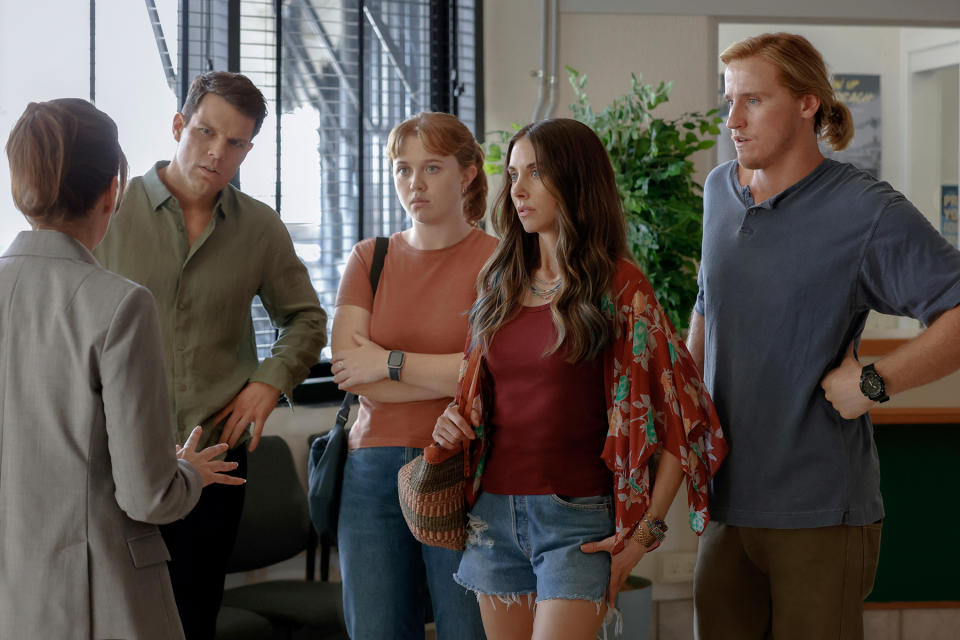‘Apples Never Fall’ Is the Latest Example of a Bigger Problem: A-List Emmy-Bait
- Oops!Something went wrong.Please try again later.
- Oops!Something went wrong.Please try again later.
- Oops!Something went wrong.Please try again later.
- Oops!Something went wrong.Please try again later.
- Oops!Something went wrong.Please try again later.

Did you know that there was a miniseries in the spring of 2022 about the Watergate scandal that starred Oscar winners Julia Roberts and Sean Penn? No? Okay, did you know that there was a miniseries last March about the WeWork scandal starring Oscar winners Jared Leto and Anne Hathaway? No again? Then what about Oscar winner Rachel Weisz playing dual roles in a miniseries from last April? Anyone? Anyone?
Those shows were, respectively, Starz’s Gaslit, Apple’s WeCrashed, and Prime Video’s Dead Ringers. That none of these likely (dead) ring a bell, despite those impressive stars, isn’t a surprise. They’re part of an unfortunate latter-day Peak TV trend, where the stretch from March through May every year gets flooded with miniseries, all featuring famous and/or award-winning stars, all of them designed to score big at the Emmys(*).
More from Rolling Stone
The 'Traitors' Season Finale Will Make You Laugh, Cry, and Horny for CT
How to Watch 'The Traitors' Season Two Finale and Reunion Show Online
(*) The Emmy eligibility period ends before June, and voting begins shortly after, so the goal is to drop things when they’ll be top of mind for viewers, like how movie studios used to drop every Oscar contender from Thanksgiving through New Year’s Eve.
Instead, most come and go with barely a ripple, either with viewers or with awards voters. Dead Ringers got a cinematography nomination, Gaslit got the same plus a couple of other small technical nods, and WeCrashed got nothing. And none of their pedigreed stars got anything. (This was a real shame in Weisz’s case, as she gave two great performances for the price of one, even if few noticed.) Sometimes, multiple spring projects try to cover the same subject, with similar results: last year’s Watergate miniseries White House Plumbers got blanked at the Emmys, while two separate minis about acquitted Texas killer Candy Montgomery (Hulu’s Candy in 2022, with Jessica Biel and Melanie Lynskey, and last year’s Love & Death on Max, with Elizabeth Olsen and Jesse Plemons) netted a combined whopping two nominations. (Candy for its opening credits, Love & Death for Plemons, but not Olsen.)
Part of the problem is the overcrowding of the Emmy-bait window. There are just too many of these projects, competing not only with one another but with ongoing series that have built-in viewer loyalty. WeCrashed and the others — including Jennifer Garner’s Apple miniseries The Last Thing He Told Me — premiered at roughly the same time that Succession, Ted Lasso, The Marvelous Mrs. Maisel, and Barry were all releasing their final seasons. If you’re not a professional TV critic, your viewing time is limited. If forced to choose, odds are you’re going to stick to the shows you already know and like.
But there’s also the issue that so may of these projects feel like naked grabs at awards glory that almost never comes, with little to recommend them beyond those familiar stars. Neither of the Candy Montgomery projects seemed to have a take on the case, other than that it would provide a juicy role for Biel and then Olsen to play. White House Plumbers could never decide on a tone. Most of these also tend to be based on real events and/or books, because Hollywood is increasingly afraid of original ideas, even if those tend to be what connect best with TV viewers. There was a miniseries from last spring that featured big names, struck a chord and won a ton of Emmys, but it was Netflix’s Beef, which was based on nothing but the imagination of its creator, Lee Sung Jun(*).
(*) For that matter, Succession, Barry, and Mrs. Maisel are all original concepts, and while Ted Lasso is technically adapting a handful of NBC Sports commercials, the people who made those ads co-created and/or starred in the show.

And if you’re wondering why I spent the first 600 words of a review of the new Peacock miniseries Apples Never Fall(*) without so much as mentioning the show, it’s because the most interesting thing about it is how it’s uninteresting in the same way that so many recent projects like it have been. It’s based on a book by bestselling author Liane Moriarty. Its high-profile cast includes Annette Bening, Sam Neill, Alison Brie, and White Lotus alum Jake Lacy. And it felt like every detail of it was being Eternal Sunshined from my memory even as I was watching.
(*) Why would any streamer other than Apple make a show with that name? HBO had the good sense to change the title of its Los Angeles Lakers drama from Showtime to Winning Time, just to avoid confusion with its old pay cable rival.
This is the third recent TV show adapted from a Moriarty novel, following Big Little Lies and Hulu’s Nine Perfect Strangers. The first was an Emmy juggernaut, and a big enough hit to graduate from miniseries to ongoing, even though there wasn’t any story left to tell for a second season. (And the stars are now talking about reuniting for a third.) The second got no awards traction, despite Nicole Kidman and Melissa McCarthy in lead roles. (It will also be back for a second season for …reasons.) Benning, Neill, and Brie aren’t names on a par with Kidman, McCarthy, Reese Witherspoon, et al. But the approach is similar, attempting to blend light interpersonal comedy, social commentary, and a potentially much darker mystery. Those elements just don’t mix nearly as well as they did in the first BLL season.
Bening and Neill are Joy and Stan Delaney, recently retired from the Florida tennis academy they’ve devoted their lives to — often to the neglect of their quartet of now-adult children. Amy (Brie) is the flaky underachiever, trying to get a life coaching business off the ground while renting a bedroom in the house of a guy in his 20s. Troy (Lacy) has made a fortune at a VC firm, but can barely contain his resentment of Stan at family get-togethers. Younger siblings Logan (Conor Merrigan Turner) and Brooke (Essie Randles) have a warmer view of their demanding father, but all four have been distant lately with Joy, and as a result are guilt-stricken when she vanishes without a trace, perhaps the victim of foul play. Did Stan do it? Could it be Savannah (Georgia Flood), a mystery woman who burrowed her way into Stan and Joy’s home for reasons the siblings still don’t understand? Or is there a chance one of the kids is shadier than they seem at first?
Adapted by Melanie Marnich, Apples has a split timeline, bouncing back and forth between the aftermath of Joy’s disappearance and events from several months earlier that inspired whatever happened to her. The fractured chronology muddles the story rather than making it more tantalizing. And the gimmick of naming each episode other than the first after a member of the family adds little, because the POV only slightly shifts towards that person. The theoretically Amy-centric third episode, for instance, spends a lot of time on Troy having an affair with a co-worker, and features a key revelation about Savannah and another member of the family. So there’s little to differentiate one episode from the next, and each time the investigation into Joy’s disappearance seems to make significant progress, we get stuck in flashback land again.
The performances are all solid, even if Neill is the only one who gets to play even a bit against his most familiar type(*), as a taskmaster who has keeps projecting his resentment at the shortening of his own tennis career onto everyone around him. There’s just not enough story here, and the show never figures out how to balance the idea that Joy could have been brutally murdered against various comic or soapy hijinks involving the kids. Without spoiling the ending, the finale wraps up not by tying together the story’s light and dark sides, but by cavalierly discarding one of those halves altogether, in a way that left me wondering what the point of any of it was.
(*) For years, Lacy only got cast as nice guys, but he was so convincing as an entitled manchild in White Lotus Season One that it now feels like he’s always been playing jerks.
Bening and Neill aren’t the marquee names they were at their Nineties peak, and Brie never quite exploded out of Community the way it seemed she was going to. Still, there was a moment in television where a miniseries with this cast, based on a book by an author like Moriarty, would have been a very big deal. Instead, it’s yet another unremarkable miniseries in a period that’s about to be flooded with them, likely to struggle to attract both audiences and general awards love.
The funny thing is, it wasn’t that long ago that Big Little Lies and White Lotus were gaming the Emmy system by competing as limited series for their first seasons, because that was viewed as the easier path to nominations and wins. This year, things have tilted so wildly towards miniseries that, coupled with the departures of Succession, Better Call Saul, and many other drama category vets, it’s going to be a lot easier to get nominated as an ongoing show than having to compete with Shogun, True Detective: Night Country, et al. If Peacock really wanted to get some Emmys, maybe a pointless second season of Apples Never Fall should be announced right now?
All seven episodes of Apples Never Fall begin streaming March 14 on Peacock. I’ve seen the whole season.
Best of Rolling Stone

